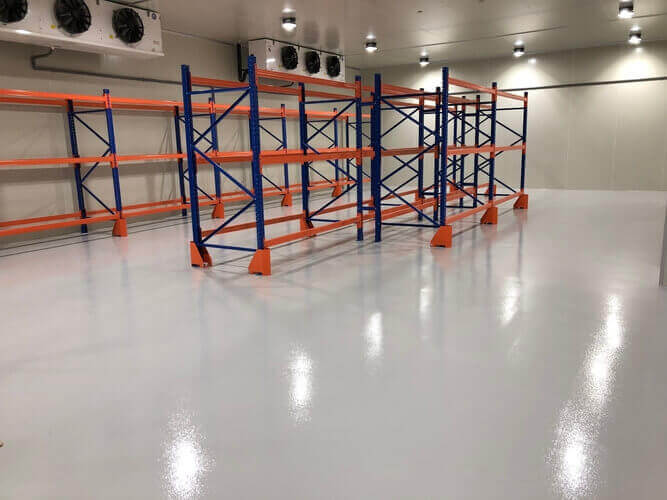
What is Epoxy Floor?
Epoxy flooring is a synthetic resin floor laid on top of concrete substrates as protection and decoration. The methods can comprise several layers of thermosetting resin-coated that will be applied on a concrete base. Once the resin layers have entirely restored, the floor system forms a permanent and robust bond, acting as a waterproof and decorative barrier to protect the substrate. The epoxy flooring is sturdy, robust, and stain-resistant, all thanks to the reliable liquid process. This flooring type is most commonly used in hospitals, industrial environments, schools, warehouses, and even garages. Additionally, epoxy flooring can also be useful for residential living areas.
Types of Epoxy Floor
1. Flake Epoxy Flooring
Flake epoxy flooring is when colorful pieces or flakes are planted on top of the wet plate flooring until it is dried and set. This provides an entirely different and unique look every time.
2. Self Leveling Epoxy Flooring
The self-leveling epoxy setting can be put over old concrete floors easily. This floor type generates a smooth surface and can be used in industrial areas like Electronic assembly, laboratories, office buildings, food and beverage production, and more.
3. Mortar Epoxy Coating
Typically used in heavy industry places, Mortar Epoxy Coating is known to be the sturdiest epoxy coatings. Virtually, it can fix cracks before installing the flooring.
4. Epoxy Terrazzo Coating
Most commonly used in hallways of offices, school buildings, mall and large areas, Epoxy Terrazzo Coating is easy to clean and is highly decorative.
5. Epoxy Anti-Static Flooring
Epoxy Anti-Static Flooring is specifically invented to be applied in a static-free environment, where equipment could be exposed to static shock. This type of flooring is typically installed in hospitals, labs, and factories producing electronics.
6. Graveled Epoxy Flooring
Graveled Epoxy Flooring is the most customizable and beautiful epoxy flooring. With its extremely attractive designs, this flooring type is mostly used to place brand logos on the business floor.
The Five Advantages of Epoxy Floor

1. Aesthetics
Epoxy flooring is high aesthetics and can be applied as a seamless, easy-to-clean floor surface with wide-ranging customizable color options and various gloss levels (glossy, satin, matte).
2. Maintenance
The concrete layer in the epoxy flooring is protected from dirt, liquids, chemicals, and other impurities, making the floors easy to maintain and kept clean.
3. Safety
Epoxy flooring can include a non-slip profile by broadcasting sand onto the wet body coat during application. This is an essential facet for commercial or industrial spaces as occupants’ safety is a primary concern.
4. Durability
An industrial flooring withstands daily heavy loads from various equipment and manufacturing processes. An epoxy floor can suffice most industrial manufacturers’ durability needs with a material that is erosion and chemical-resistant.
5. Environment Suitability
Epoxy flooring is excellent for various environments such as industrial, commercial, medical, food, and beverage manufacturing, as it has one of the most versatile flooring options.
Epoxy flooring prices in Malaysia
Epoxy flooring is a popular choice for many commercial and industrial applications due to its durability and easy maintenance. epoxy flooring is also becoming increasingly popular in homes for its aesthetic appeal and slip-resistant surface. epoxy floors are available in a wide range of colors and finishes, making it easy to find a style that suits your space.
If you’re considering epoxy flooring for your home or business, it’s important to know the potential epoxy flooring cost.
Epoxy flooring prices in Malaysia can vary depending on a number of factors, including the type of epoxy used, the size of the space, and the complexity of the installation. Generally speaking, epoxy flooring is more expensive than traditional flooring options like carpet or tile. However, epoxy floors are also much more durable and easy to maintain, making them a good long-term investment.
The type of epoxy used is one of the biggest factors that will affect epoxy flooring cost. There are two main types of epoxy: 100% solids epoxy and water-based epoxy. 100% solids epoxy is more expensive than water-based epoxy, but it also has a number of advantages. 100% solid epoxy is more durable and resistant to stains and scratches, making it a good choice for high-traffic areas. Water-based epoxy is less expensive and easier to install, but it is not as durable as 100% solids epoxy.
Try Out Epoxy Flooring with Advanced Polytech
Are you interested in giving epoxy flooring a try, whether at your home, office, or factory? Contact us, and we will walk you through the different types of epoxy flooring available and is the most suitable for your usage and its incredible benefits.


